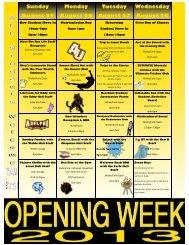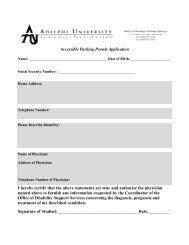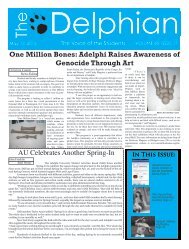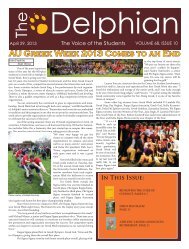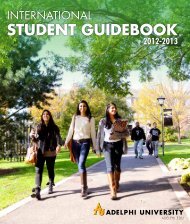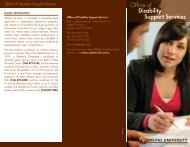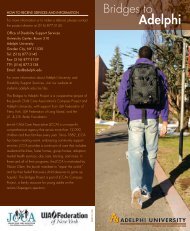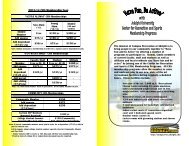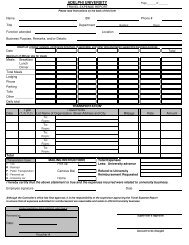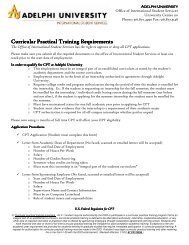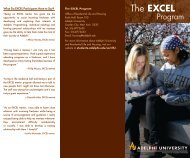Guide to Student Life - Campus Life - Adelphi University
Guide to Student Life - Campus Life - Adelphi University
Guide to Student Life - Campus Life - Adelphi University
Create successful ePaper yourself
Turn your PDF publications into a flip-book with our unique Google optimized e-Paper software.
complete, the fact finder will summarize the case in writing. This summary will be provided<br />
<strong>to</strong> the parties involved in the suspected violation and <strong>to</strong> the chair of the Committee. The chair<br />
will contact the remaining 22 members of the Committee (10 other faculty members and 12<br />
students) for the purpose of convening a hearing board. The chair will bear in mind that a<br />
finding of the Committee requires a minimum of 10 votes, four of which must be cast by<br />
student members. The hearing is chaired by the fact finder, who does not cast a vote.<br />
<strong>Student</strong>s may present their own case or have a faculty advocate represent them. They cannot be<br />
advised by parents or lawyers during the hearing. Character witnesses will be limited <strong>to</strong> two,<br />
whose statements will normally be submitted in writing. The hearing board may call expert<br />
witnesses as deemed useful, in addition <strong>to</strong> material witnesses. The person alleging a violation<br />
and the student accused will be present. All members of the hearing board present are entitled<br />
<strong>to</strong> ask questions of anyone speaking for either side. If a student refuses <strong>to</strong> attend a hearing, the<br />
hearing can and will be held without the student present. The fact finder will present whatever<br />
facts may have been found that might make a case on the student’s behalf.<br />
After the presentations and questions are concluded, the board will deliberate in private. After<br />
deliberation, votes will be cast by written ballot. The chair will tally the votes in the presence of<br />
all the members. A minimum of two-thirds will be required <strong>to</strong> affirm a violation. In Committee<br />
hearings, the presumption will be of innocence and the burden of proof will fall squarely<br />
on the person alleging a violation. A vote <strong>to</strong> affirm a violation should be based on clear and<br />
convincing evidence.<br />
If two-thirds or more of a minimum of 10 voting members (with at least four students present<br />
and voting) vote <strong>to</strong> find a violation, the board will then proceed <strong>to</strong> consider a penalty. The<br />
following range of penalties is within the power of the board <strong>to</strong> impose:<br />
If the violation is the first offense <strong>to</strong> come before the board and only involves the work of<br />
the student in question, that is, it does not involve the sabotage of someone else’s work<br />
or such theft or damage harming another student, the minimum penalty will be probation<br />
for one semester after that in which the violation occurred. (Depending on the timing of<br />
the hearing, this penalty and others may be imposed immediately <strong>to</strong> include the semester<br />
in which the violation occurred.) This will be true even when the student is remorseful<br />
or the offense is deemed relatively minor. The probation does not appear on the student’s<br />
transcript nor does it become part of any permanent record publicly available. Therefore,<br />
if the student is never again found in violation, there are no permanent consequences <strong>to</strong><br />
this penalty. It is unders<strong>to</strong>od that any proven violation during the probationary period will<br />
result in expulsion. If the violation is deemed grievous and/or the student is without proper<br />
remorse, the Committee may impose a more severe penalty, such as more lengthy probation<br />
or suspension. The board may choose whether the suspension applies <strong>to</strong> the semester in<br />
which the offense was committed (and may in some cases then entail a retroactive loss of the<br />
semester’s credit) or is <strong>to</strong> apply <strong>to</strong> an upcoming semester.<br />
If the violation is a second offense but one not incurred while the student is on probation or<br />
if the offense involves damage <strong>to</strong> the work of another student, the minimum penalty will be<br />
suspension either for the semester during which the offense occurred or for the next semester.<br />
If the offense is judged particularly grievous and/or the student is without proper remorse, the<br />
board may opt for a more severe penalty, longer suspension, or expulsion.<br />
If the violation is committed during a probationary period or is a third offense, the au<strong>to</strong>matic<br />
penalty will be expulsion from the <strong>University</strong>.<br />
After the hearing board has considered the possible penalty, the chair will determine what seems<br />
<strong>to</strong> be the penalty thought most reasonable by the majority. There will then be a second vote by<br />
94



